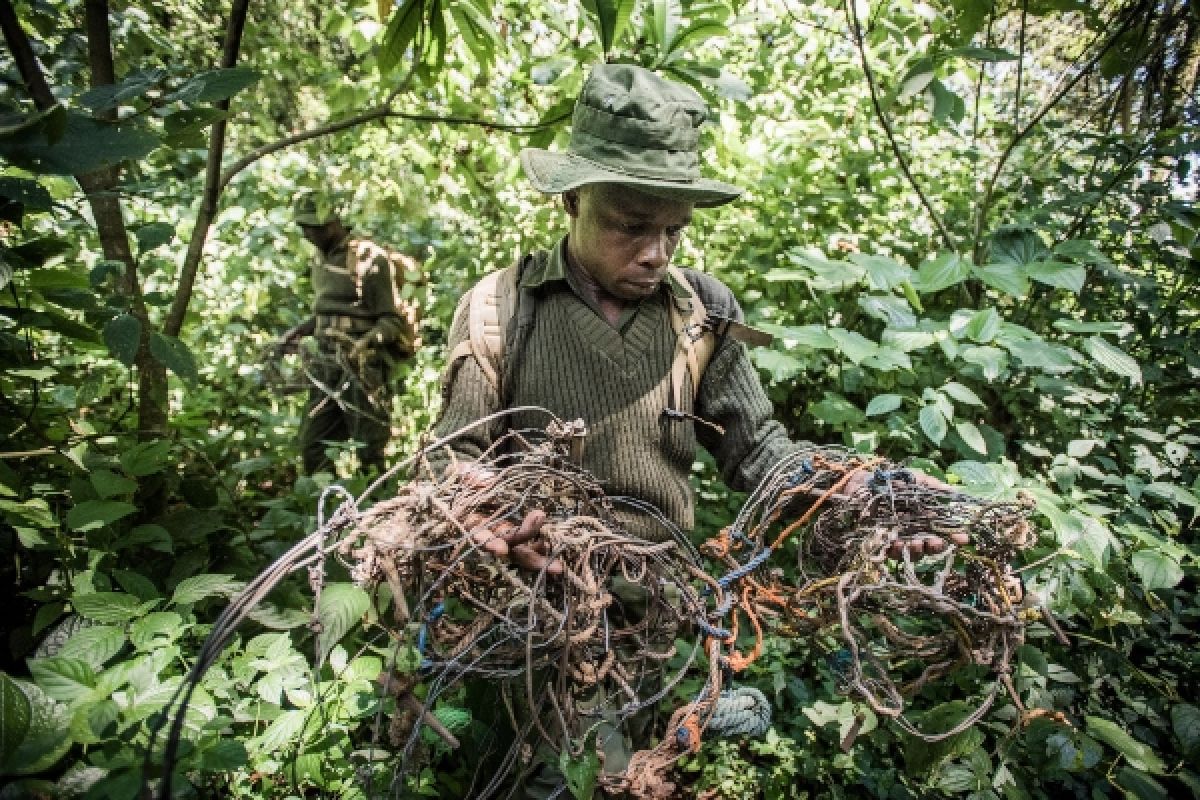With the West imposing Covid-19 quarantine laws against travellers from Africa, the future of the continent’s lucrative safari industry hangs in the balance. And, as Britt Collins discovers, a collapse in tourist numbers not only risks pushing millions into poverty, it also threatens the long-term survival of Africa’s wildlife, forests and savannahs – increasing the likelihood of future pandemics in the process.
Big cats, elephants, rhinos and other animals are among the countless casualties of the post-lockdown collapse of Africa’s booming tourist industry.
Safaris, hotels and private wildlife preserves have all but vanished overnight.
Beyond the impact on various countries’ economies, tourism is vital to conservation, ranger patrols and most wildlife-protection projects.
Without these revenue streams and the absence of foreign travellers, people in rural communities are becoming desperate and hunting giraffes, zebras, monkeys and other wild animals to provide food for their families or to sell for their body parts and skins.
Alongside the perils that face African wildlife — poaching, international crime syndicates, governmental and judicial corruption — bushmeat hunting poses another graver threat of future mass pandemics.
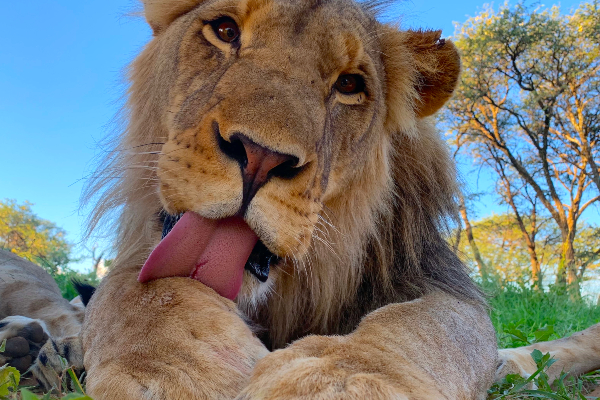
According to the World Health Organization, more than 50 per cent of the new infectious diseases in humans are caused by pathogens originating from animals or animal products, of which 70 per cent have originated from wildlife.
Other studies have indicated that the handling and consumption of bushmeat contributes to the transmission of pathogens from animals to humans.
It’s an issue that concerns Angela Sheldrick, head of Kenya’s Sheldrick Wildlife Trust.
‘We’ve seen a steady rise in bushmeat poaching over the years, and the economic pressures of the current crisis have only exacerbated the issue,’ said the Anglo-Kenyan conservationist.
‘Bushmeat poaching is behind many of the most serious pandemics and epidemics in recent history, and if the practice continues unabated, I shudder to think of what it could trigger next.’
Such fears are shared by conservationists and park wardens across the continent.
The Uganda Wildlife Authority, for example, reported a more than two-fold increase in poaching in the first few months of the country’s harsh Covid-19 lockdown compared to the same period in 2019.
While rangers from the Sheldrick Wildlife Trust (pictured below) confiscated more than 10,000 snares from one Kenyan park alone during 2020 – again more than twice the 2019 figures – as people in the heavily tourism-dependent region struggle to feed themselves and their families.
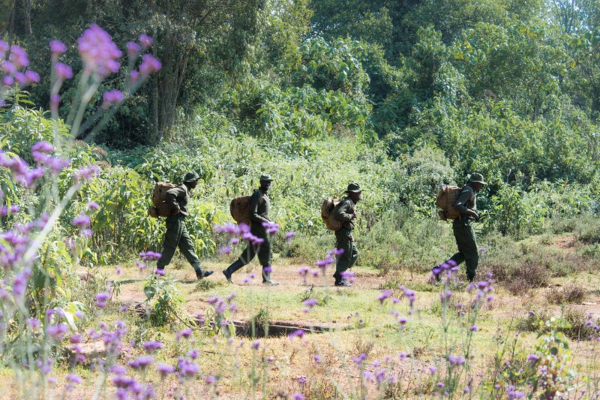
If 2020 was a bad year for Africa, 2021 looks set to be even worse, with the introduction of punitive quarantine rules for tourists returning to Europe from Africa.
In the UK, for instance, arrivals from 39 countries, including anyone arriving from all of Africa’s major tourist hotspots bar Uganda, will have to pay £1,750 (nearly $2,500) to self-isolate for 10 days in a government-approved hotel upon their return.
These draconian measures – and the exorbitant expense involved – are expected to discourage travellers from booking safaris, as Western tourists opt to holiday in countries that are not on the so-called ‘red list’, despite having much higher levels of Covid-19 cases and deaths.
Such populist measures are not just restricted to the UK, where African nations account for more than half of the ‘red list’.
Restrictions against Africans and tourists returning from Africa are being rolled out across Europe, North America and Australia, quashing hopes of a safari recovery this year.
One Danish operator, Deep Forest Safaris, for instance, had to postpone more than 90 per cent of its bookings to 2022 as a result of increased restriction against returnees from Africa.
It’s likely to have a devastating impact on the economies of countries like South Africa, Kenya, Tanzania, Namibia and Zimbabwe that are heavily reliant on tourist jobs and income.
Some 70 million tourists flocked to Africa in 2019, according to the UN’s World Tourism Organisation.
Tourism contributes nearly 10 percent to Africa’s economies and the sector employed 25 million people, with safaris worth more than $12.4 billion to East and Southern African economies alone, according to the UN.
With travel at a standstill, conservationists and rangers fear the wild animals that draw millions to Africa and make it so magnetic are more vulnerable to poachers.
Tim Davenport, of the Wildlife Conservation Society, believes that as lockdown measures around the continent continue and the economic consequences of this and the tourism collapse intensify, massive poaching surges will increase.
‘With fewer people about, it is inevitable that illegal activities will occur.’
Nico Jacobs, a bush pilot and co-founder of South African charity Rhino 911, believes the poaching surge has reached crisis levels.
‘I’ve done this job for 15 years, and I’ve never been so busy,’ said Jacobs, whose charity rescues baby rhinos orphaned by poachers and provides a lifeline to wounded animals.
‘Last year we had calls to over 40 rhinos in a period of 72 hours. That’s how critical the situation is now.’
Every year poaching accounts for the death of 1,600 rhinos killed for their horns – which are hawked as bogus cures for everything from cancer to impotence in China and Southeast Asia – leaving hundreds of orphans behind.
‘If poaching continued at its current staggering level, rhinos will soon be hunted to extinction,’ Jacobs explained.
With poaching on the rise once more, a small team of vets, rangers and pilots have been scrambled into conducting emergency horn-trimming operations as a precaution.
South Africa has already dehorned dozens of rhinos in three popular game parks, to prevent the further threat of armed poachers taking advantage of the post-Covid-19 crash in tourism to kill them for their horns.
Across Africa, lodges, camps and conservancies are struggling.
Even popular safari hotspots, such as Kenya, Rwanda, Tanzania, and South Africa – which has been the hardest hit by Covid on the continent – have had to lay off or furlough staff and stall or shelve conservation projects.
But those that survive this fallow period will likely bounce back once if and when things getting moving again.
For wildlife sanctuaries and refuges that look after rescued animals and depend on volunteers and donations, the pandemic has been catastrophic.
The lack of visitors has left many without much-needed revenue, facing mounting bills for food, medicine and general care.
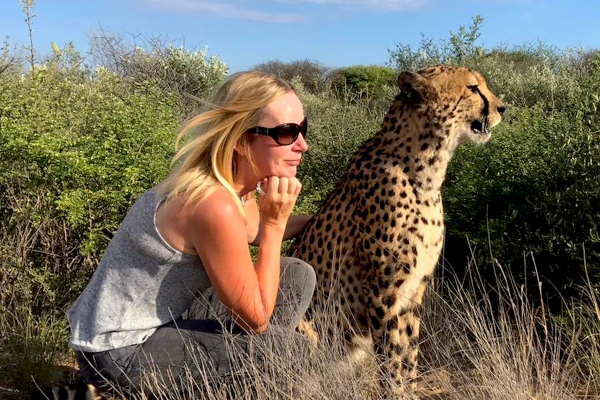
Harnas Wildlife Foundation, Namibia
Tucked away amid the golden sands and grasslands of Namibia’s cattle country, Harnas is home to nearly 1,000 big cats, primates, antelopes and many other wild orphans, as well as rescued cats, dogs, sheep, goats, cows, horses and donkeys.
Since its founding in 1978, the sanctuary has taken in thousands of animals that have been abandoned or abused and can’t make it on their own in the wild. Much of its funding and workforce comes from volunteers, who fly in from abroad for weeks or months-long stints at the site set amongst the stark wilderness of the Kalahari Desert, a three-hour drive outside the capital Windhoek.
‘You can’t imagine the devastation this is causing us. No visitors, no income and so many mouths to feed,’ said Marieta van der Merwe, who began Harnas with her late husband Nick after they persuaded a man on a dusty Namibian road to sell them a maltreated vervet monkey.
They started hand-raising wild babies in their home and gradually transformed their cattle ranch into a real-life Noah’s Ark.
This family-run 20,000-acre refuge has since expanded to become southern Africa’s largest wildlife orphanage, offering visitors the chance to touch, walk, feed and tend lions, leopards, cheetahs, baboons, antelopes and all sorts of wild creatures.
Wildly successful, it had attracted such celebrity patrons as Angelina Jolie and Brad Pitt, as well as flocks of volunteers who fall in love with the place for its offbeat charm and menagerie of tame and wild orphans, who all have names and heart-breaking stories.
Some were rescued as cubs, like the charity's newest arrival, Desert, who had been kept in a plastic drum with no shade or water.
Others, considered nuisance animals by farmers, are removed from farms and brought to Harnas to live out their lives peacefully.
‘When you see the state of the rescues when they come here, it really hits you in the heart,’ said Kaatje Steenhoudt, a young Belgian accountant who’d been volunteering on and off for months since 2012 and is now unable to return to Namibia because of travel restrictions.
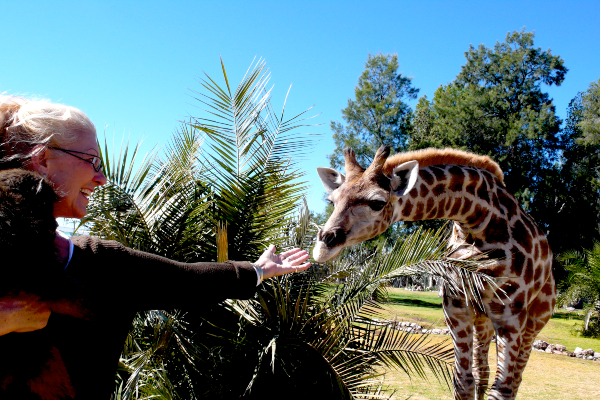
In this quirky, otherworldly environment, the property features several rustic stone cottages with copper baths and private porches, tucked in landscaped gardens, for guests who just want to come and enjoy the animals, silence and mesmerising views of the sweeping desert.
Now the once-buzzing sanctuary is scrambling for survival. ‘It’s a very, very hard time,’ said Melanie van der Merwe, Harnas’s operations director and Marieta’s daughter-in-law.
She recently moved back on the farm with her two college-age daughters to help manage the workload.
‘Things are so dire, Marieta sold her private car, jewellery, anything and everything of value that she could sell or pawn.
‘We don’t have the support structures or financial firepower in Africa as in Europe, so the pandemic has been far more damaging here, but we’re determined to keep our animals alive,' said Melanie van der Merwe. 'We’ve dipped into our reserves, but I don’t know how long this will be sustainable. From next month, we’ll be going into the red.’
Harnas needs a minimum of $700,000 Namibian dollars (approximately $48,000 US dollars) per month to operate.
‘With normal lodges or camps, they shut their doors and wait out the pandemic, but with a rescue centre you still have to provide for and care for the animals. We need volunteers to keep it afloat. So, when countries like Britain, Germany, France and Australia, where most of our volunteers and guests come from, close their borders or impose harsh travel restrictions, it affects us severely.’
With no income coming in, they have had to take other desperate measures, laying off half of the staff and shooting wild game outside the sanctuary to feed the big cats and rare African painted dogs living at the reserve.
‘Luckily we’ve had rains so everything is lush and green and there’s a lot of game around.’
Before the pandemic, Harnas had a steady stream of guests and 50 to 60 volunteers at a time, international travellers who booked several months ahead. At the moment, the animals are being cared for by a skeleton staff, seven European volunteers who managed to get into the country, alongside Marieta and her family and their long-time San staff.
As well as preserving Namibia’s wildlife, the van der Merwes have a long history of supporting the nomadic San bushmen.
They maintain a free school and health clinic for a small community who live on and around the sanctuary grounds.
‘We’re providing for 60 San families, the most marginalised people in Namibia, putting 80 children through school,’ said Melanie van der Merwe.
‘Marieta’s trying to keep the people, because if they lose their jobs now, they’ll starve and start hunting wild animals, which is happening all over Africa at the moment.’
Harnas expects the ramifications of the pandemic will affect it for many months, if not years.
'If you’re going through hell, keep going,’ Melanie added, quoting Winston Churchill.
‘Marieta is 71 and working like a trojan. She won’t stop caring for her animals until she takes her last breath. We’re grinding non-stop to get the work done and keep our heads above water.’
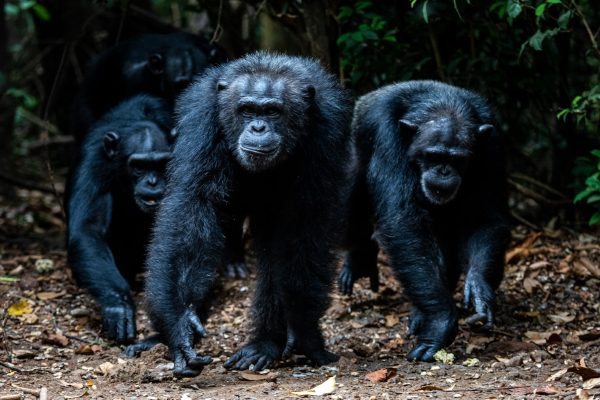
Tacugama Chimpanzee Sanctuary, Sierra Leone
Chimpanzees were destined to play an important role in Sierra Leone’s economic revival, when the critically endangered great apes were made the country’s new national animal just two short years ago. The government had plans to make the country a growing eco-tourism destination, building on the growing success of sanctuaries like the Tacugama Chimpanzee Sanctuary, cocooned amid misty hills within a rainforest near the capital Freetown.
The once-popular tourist stop-off on the edge of the Western Area Peninsula Park, shelters hundreds of orphans saved from wildlife trafficking or bushmeat poaching in sprawling semi-forested enclosures.
It was founded by Bala Amarasekaran and his wife Sharmila in 1995, seven years after they came across a sick baby chimp tied to a tree by the roadside. The Sri Lankan couple had bought the chimp, named Bruno, for $30 and nursed him back to health in their home in Freetown.
Soon, people started dropping off their unwanted pets once they became unmanageable and they found themselves caring for seven chimps in a make-shift sanctuary in the garden.
In need of space, Amarasekaran set up the reserve on a 100-acre patch of pristine rainforest in the national park, with the help of the government and international donors.
Tacugama endured through many tough times, including the 2014-16 Ebola outbreak, military coups and Sierra Leone’s brutal decade-long civil war.
Rebels raided the sanctuary several times, looting food and medical supplies, and nearly destroyed it as they seized areas around Freetown. Amarasekaran and his small staff avoided the rebel roadblocks by carrying supplies by night through the forest.
Even as the conflict raged on around them, they managed to keep the chimps safe.
Now, once again, they are facing difficult choices.
The reserve was shut for over nine months, starving it of vital tourist dollars.
‘We had to make close to 10 staff members redundant,’ explained Aram Kazandjian, the sanctuary’s development manager. Around half the sanctuary’s revenue comes from foreign visitors.
‘The staff and volunteers had been in total lockdown, not seeing their family or friends to keep the primates safe from Covid,’ Kazandjian added.
‘Even as the world has come to a standstill, we’re still taking in baby orphans at a shocking rate.’
While habitat destruction and the exotic pet trade has left many chimps orphaned, bushmeat hunting remains the greatest danger.
‘Poachers go after the mother for more meat, leaving the baby orphaned. They arrive very traumatised, having lost their mothers, and some come in with wounds.
'We’ve just taken in three infants, all victims of bushmeat hunting.’
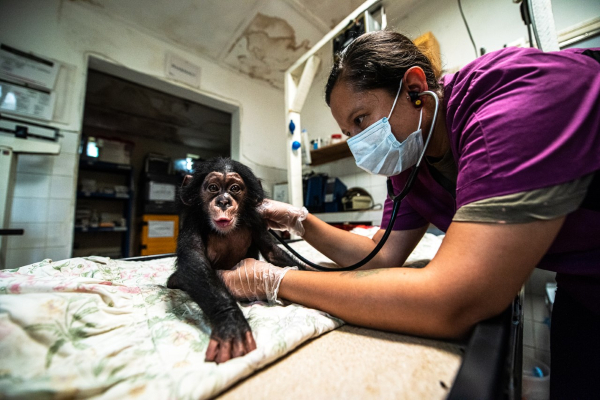
One recent arrival, a three-year-old infant named Jean, was rescued near the park with gunshot wounds on the head and chest. It is thought he was hit by stray bullets aimed at his mother. Another was brought in with gruesome cuts to his wrists.
‘But the way he carried himself was astonishing,’ said Kazandjian.
‘Baby chimps, once they’re shown a little kindness, are really resilient.
‘In the wild they’re dependent on their mums and aren’t weaned until about the age of three to four and remain with them for several years.
‘We’ve got a surrogate mother, Mama Posseh, who provides reassurance, bottle feeds them, bathes them and puts them to bed very much like human babies, along with home-schooling and teaching them the basics, such as climbing trees and using of tools. We currently have 17 babies.’
Before the lockdown, Tacugama had emerged as something of an eco-tourism success story in West Africa.
The sanctuary offered daily tours as well as overnight stays in six treehouse eco-lodges or traditional roundhouses with private decks overlooking a serene swathe of tropical rainforest.
Viewing platforms gave Western visitors a bird’s-eye view of the chimps as they fed, played and socialised.
There were also cinema nights, guided forest walks and other activities for tourists and locals.
These days, the reserve is scraping by with a trickle of local visitors.
But Kazandjian remains optimistic and they are continuously finding new ways to adapt.
‘Since we’re not getting any foreign guests, we’re focusing on the expat market, encouraging them to visit the sanctuary. We had a yoga retreat, family days, hikes and bird watching, and that does generate a bit of money.
'We’re hosting a fundraiser at one of the hotels in Freetown. It costs about $2,000 per chimp to look after them. If you multiply that by 99 that’s about $200,000 a year just the animal portion of the budget.’
Crucially, though, Tacugama doesn’t just care for its rescued residents.
They also safeguard the forest that Sierra Leone’s wild apes and other animals call home.
The area is constantly under threat as a result of poaching and plundering the rosewood trees by struggling communities.
The sanctuary has taken on the additional mission of patrolling the national park.
‘It’s actually the government’s responsibility,’ Kazandjian explained.
‘Historically, they’ve done an appalling job, from corruption to mismanagement of funds to lack of training and equipment for the rangers. So, we’re working alongside the NPAA [National Protected Area Authority] and have also trained and hired 45 eco-guards from the local community to patrol the protected and unprotected areas for illicit activities.
'We’ve continued to pay the rangers’ salaries out of our reserves to keep the patrols going. Working with the communities, especially during the pandemic, we need to keep the momentum going.’
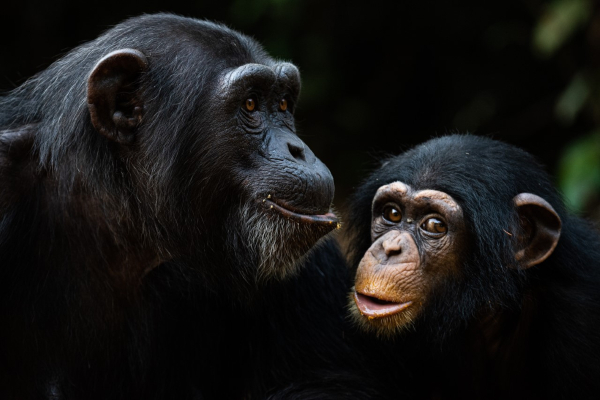
Despite it’s almost-year-long closure, Tacugama has continued its conservation projects, planting 60,000 trees and creating the country’s first wildlife corridor.
‘What this does is restore the wild chimps’ natural habitat. It allows them safe passage and provides a source of food, while minimising human-wildlife conflict in the sense that they don’t need to raid farmers’ crops.’
Tacugama also has taken an active role in shaping the national policy, working with the Sierra Leone government to tighten laws on bushmeat hunting and revising the existing 1972 Wildlife Conservation Act, as well as Interpol to crush wildlife trafficking.
‘We’re doing a lot of advocacy and education programmes and done a successful job of almost bringing the pet trade to a halt in the country. Yet, despite our efforts, we’re still receiving orphaned infant chimps.’
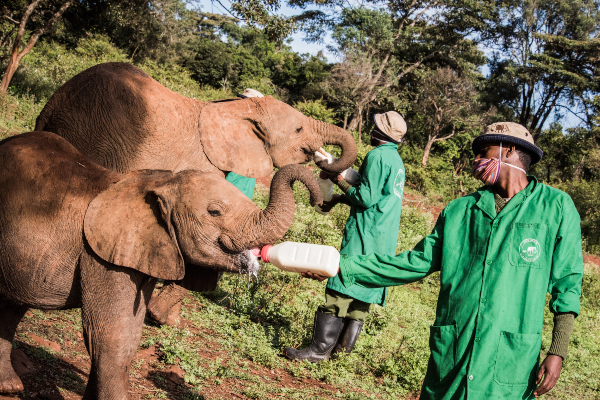
Sheldrick Wildlife Trust, Kenya
Before the Covid-19 lockdowns, up to 500 tourists used to visit the Sheldrick Wildlife Trust in Nairobi each day, bringing in thousands of dollars in revenue to pay staff and fund anti-poaching patrols.
Founded in 1977 by the Kenyan environmentalist Daphne Sheldrick, the elephant and rhino orphanage rescues victims of poaching and human-wildlife conflict, reintroducing them to the wilds of Kenya.
Famous in the West thanks to a BBC wildlife series, Elephant Diaries, that followed the late conservationist and the keepers’ work, tourist once flocked to the Nairobi orphanage for the chance to bottle-feed the calves.
‘The past 12 months have been tough,’ said Angela Sheldrick, CEO of her late mother’s charity.
‘We rely on our public visits to raise vital funds. We’ve also lost the opportunity to connect with new supporters. But I’m extremely proud of how our team has risen to the challenge and humbled by our global supporter base, which has rallied around us during this difficult chapter.
‘The orphans, for their part, seem none the wiser that anything is amiss. Their routine remains unchanged and they continue to enjoy their days exploring Nairobi National Park under the watchful eyes of their beloved keepers.’
While the rest of the world is stilled, the Sheldrick Wildlife Trust, alongside the Kenya Wildlife Service, works across the entire country to protect animals.
‘Since the onset of the pandemic, we’ve rescued all sorts of creatures, including zebras, buffalos, elands, oryxes, ostrich and, of course, elephants.’
Among the recent rescues is an enchanting calf called Rama, found abandoned in Laikipia with a peculiar leg deformity that makes him appear bow-legged.
‘Rama was in a desperate state when he came to us, emaciated and riddled with parasites, but his transformation in a few short weeks has been striking. Now he’s going on long jaunts in the forest with the other orphans and putting on condition fast.’

Milk-dependent for the first three years of their life, orphaned baby elephants require around-the-clock care.
Their human attendants sleep in bunkbeds in the stables with them.
They need constant comfort and endure long nights of screaming for their lost mothers they witnessed being shot or hacked to death by poachers.
Many are so traumatized they lose their will to live.
But the calves who recover after losing their families stitch together new ones. With their huge capacity for love and forgiveness, they bond deeply with their nursery companions and human caregivers who bottle-feed them, take them for walks and teach them to forage, put them to bed and soothe them when they cry at night.
Alongside its rescue-and-rehabilitation work, the Sheldrick Wildlife Trust runs 13 anti-poaching units and five mobile veterinary teams, carrying out water relief for wildlife during droughts, aerial surveillance, canine units and ground patrols for recovering deadly snares across an area that spans 10 million acres, to protect wild lives from harm.
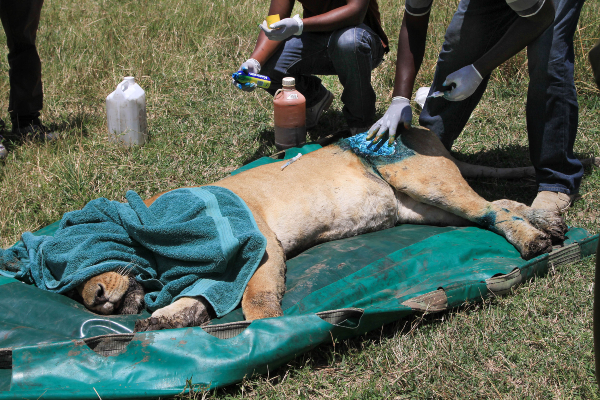
Elephants have been persecuted by humans for generations, with the population decimated from 3.5 million in the late-70s to possibly less than 400,000 today.
The World Wildlife Fund estimates that 20,000 to 30,000 African elephants are killed each year for their tusks to feed the insatiable demand for ivory in China and southeast Asian, steering the species dangerously nearer extinction and Africa towards an unfolding ecological disaster in the process.
Elephants are essential to the wellbeing of all other species.
‘Elephants are the gardeners of Eden,’ as the late Daphne Sheldrick said in a recent documentary about the orphanage.
‘They push down trees, which recycles nutrients locked in wood for other animals, create trails through the bush, seal the waterholes so they last longer into the dry season, trigger the cycles between the grasslands, which supports the grazing species, and the woodland, which supports the browsing species. Without these magnificent giants, a lot of other animals will go extinct.’
Given the current rising threat of the bushmeat crisis and poacher incursions, Daphne Sheldrick's daughter Angela said the charity has added two more anti-poaching teams and another mobile veterinary unit to ensure the wildlife survives and thrives.
‘Raising orphaned wildlife is futile if they don’t have a protected wilderness to call home, so we take a 360-degree approach to conservation and all our projects are interconnected,’ explained the charity's CEO.
‘In Kenya, national parks and other protected areas remain safe thanks to extensive anti-poaching initiatives. However, wildlife living outside of protected areas are highly vulnerable. In response to this, we’re looking into ambitious translocation projects to move species great and small from these “danger zones” into protected areas where they have a future.
‘Without intervention, untold numbers of creatures will lose their lives.’
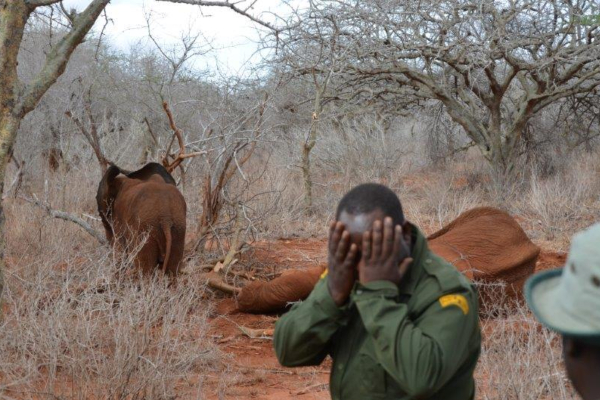
To find out more about the charities mentioned, or to donate, see, sheldrickwildlifetrust.org, tacugama.com, harnas.org.


